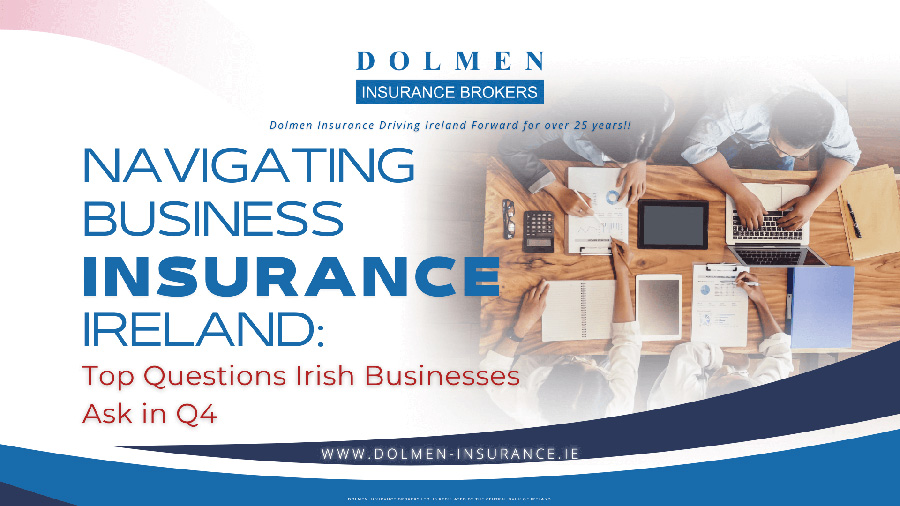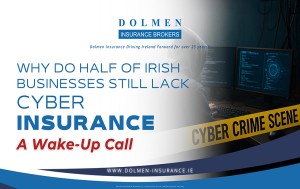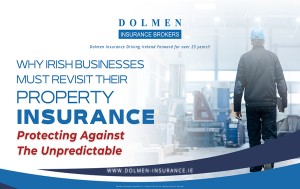
Navigating Business Insurance in Ireland: Top Questions Irish Businesses Ask in Q4
As the final quarter of the year approaches, Irish businesses face heightened risks and fresh opportunities. Seasonal peaks, winter storms, and increased cyber threats place extra pressure on risk management. Business owners frequently reassess their insurance needs during this busy period. Through conducting independent research and analysing the data, our team has developed a deep understanding of the questions that have been dominating Irish searches. Our aim is help people like you and the company decision-makers prepare effectively.
Below are ten of the most frequently searched and asked business insurance questions from Irish businesses in Q4, along with guidance to address them.
Are Business Insurance Premiums Tax-Deductible?
This is one of the most common year-end queries. Business owners often wonder if their insurance premiums can lower their tax bills. In Ireland, Revenue allows many business insurance costs as deductible trading expenses. These include public liability, employers’ liability, professional indemnity, and business interruption premiums.
According to Revenue guidelines, premiums qualify if they are “wholly and exclusively” for the business. For example, insurance for company vehicles or offices typically meets this test. However, cover for personal items or mixed-use property may require apportionment. Therefore, accurate bookkeeping is vital. Businesses should keep detailed premium invoices and certificates in case of audits.
Year-end is the ideal time to review your records and ensure all allowable costs are claimed. It’s also an ideal time to review your insurance needs, talk with you broker and analyse your cover and protection. At Dolmen our team of experts would be more than happy to help.
What Insurance Is Needed to Trade at Christmas Markets or Pop-Ups?
Pop-up shops and Christmas markets surge in popularity during Q4. Local authorities and event organisers usually require proof of insurance before granting a stall licence. Typically, a public liability policy with at least €2.6 million cover is mandatory. Many councils insist on €6.5 million for food or craft traders.
Employers’ liability is also essential when hiring staff, even on a temporary basis. This covers workplace injuries and protects your business from costly claims. Many organisers request that their entity be noted as an “additional insured” on your policy.
Securing cover early prevents delays in getting licences. Moreover, it reassures customers and event organisers that your business takes safety seriously.
Is Employers’ Liability Insurance Legally Required for Seasonal Staff?
Many businesses hire extra staff to cope with Christmas demand. Employers’ liability insurance is not legally compulsory in Ireland, but it is considered best practice and is often required by contracts. It protects businesses if an employee suffers an injury or illness at work.
The Health and Safety Authority stresses that employers have a duty of care to all staff, including temporary workers. Claims can be substantial, especially if injuries result in long absences. According to the Personal Injuries Assessment Board (PIAB), the average workplace injury claim was €23,427 in 2023.
Obtaining cover before hiring temporary staff reduces risk and reassures employees that their welfare matters.
What Public Liability Limit Do Venues or Councils Require?
Public liability insurance protects businesses from claims by third parties. Venues, councils, and landlords often impose strict minimum limits before allowing access to premises. In Ireland, the standard requirement is €2.6 million, but many demand €6.5 million.
Failing to carry sufficient cover can block contracts or stall market applications. It may also expose the business to uncovered legal costs if an incident occurs. Because premiums rise with higher limits, businesses should plan for this expense during budgeting.
Discussing required limits with your broker early ensures policies align with your contractual obligations.
What Details Must a Certificate of Insurance Include?
Many businesses must provide a certificate of insurance (COI) when working with clients or attending markets. This document confirms active cover and shows the policy number, period, and insured limits.
Event organisers often require the COI to list them as an “additional insured.” This means your policy extends certain protections to them. Providing an accurate COI promptly can secure contracts faster and build trust with partners.
As year-end brings numerous events, requesting your COI in advance prevents last-minute stress. Brokers like Dolmen can usually issue these within one working day.
Do Cyber Risks Increase Over the Christmas Period?
Yes. Cyber threats spike sharply during the holiday season. The National Cyber Security Centre (NCSC) reported a 26% rise in phishing and ransomware incidents targeting Irish SMEs in Q4 2023. Hackers exploit reduced staffing levels and increased online sales to launch attacks.
A data breach can halt operations and damage customer trust. Cyber insurance covers legal costs, data recovery, and reputational support. It also often includes 24/7 incident response services.
Investing in cyber insurance, while also improving security controls, can shield your business during this high-risk period.
Does Business Interruption Insurance Cover Winter Storms and Floods?
Winter weather brings severe risks to Irish businesses. Storm Debi alone caused over €150 million in insured losses in late 2023, according to Insurance Ireland. Business interruption (BI) cover can replace lost income following insured physical damage.
However, many policies exclude certain storm or flood events unless specifically added. Utility service failures and access blockages may also need endorsements. Reviewing your BI wording before winter ensures cover aligns with your exposure.
Maintaining up-to-date continuity plans also helps speed up claims and recovery.
Why Are Liability Premiums Increasing at Renewal?
Many Irish businesses have seen public and employers’ liability premiums rise at renewal. This trend stems from inflation, higher claim costs, and global reinsurance price hikes. Insurance Ireland reports that average liability claim settlements increased 12% in 2023.
Renewing policies early allows time to shop around and secure competitive terms. Brokers can also help review risk management practices to reduce premiums. Demonstrating strong safety records and claims history can influence underwriters favourably.
Controlling costs proactively is especially important as margins tighten in Q4.
What Insurance Is Required for Public Sector Contracts?
Public sector tenders often close before year-end, and they carry strict insurance requirements. Most demand public liability of €6.5 million, employers’ liability of €13 million, and professional indemnity of €1–€2 million.
Failure to meet these levels can disqualify bids. Tender documents usually require attaching your COI with exact wording. Some also ask for proof of ongoing cover through the contract term.
Consulting your broker early prevents missed deadlines and demonstrates professionalism to contracting authorities.
Are There Levies or Taxes on Insurance Premiums?
Yes, Irish non-life insurance carries several statutory charges. Most business insurance attracts a 3% Government Levy, while fire-related covers carry an additional 2% Insurance Compensation Fund (ICF) levy. These costs are automatically included in your premium.
Understanding these charges helps forecast budgets accurately. They are not optional and apply regardless of the insurer you choose. Reviewing your policy schedule can show the exact breakdown.
This clarity avoids surprises at renewal or audit time.
Planning Ahead for the New Year
Addressing these questions in Q4 can position your business for a safer, stronger year ahead. The final quarter brings unique challenges, from seasonal staff to cyber threats and storm losses. By reviewing cover, limits, and documentation now, you can avoid costly gaps. Prepare for 2026 now. Allow yourself the opportunity to focus growing your business knowing both you and it are secure.
Dolmen Insurance works with Irish businesses across all sectors to build tailored protection. Our experienced brokers can assess your current policies, advise on upgrades, and secure competitive terms from leading insurers.
With the right support, your business can enter the new year resilient and ready for growth.
Disclaimer
This blog post is for general informational purposes only and does not constitute legal, tax, or financial advice. Cover depends on policy terms, conditions, and exclusions. Always seek professional advice before making decisions regarding insurance or taxation. Dolmen Insurance accepts no responsibility for loss arising from reliance on the information provided above.






